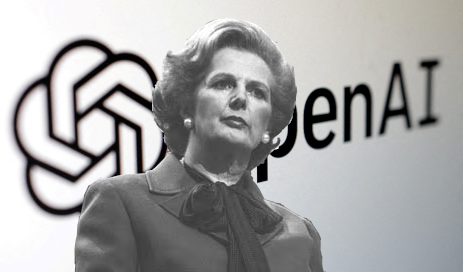
It's tempting to see the recent UK AI Safety Summit as a damp squib, preempted by an Executive Order on AI from the Whitehouse and roundly criticised by civil society for excluding everyone but tech execs. Unfortunately, none of the current debate gets to the heart of the matter: AI is already a flop, and we are being hoodwinked by a mixture of corporate and ideological agendas that will wreck public services and deepen social divisions.
AI can turn some impressive party tricks, but it's unsuited for solving serious problems in the real world. This is true of predictive AI, whose correlations are data-driven conspiracy theories, and of large language models like ChatGPT, whose plausible waffle is always trying to pull free of the facts. The real issue is not only that AI doesn't work as advertised, but the impact it will have before this becomes painfully obvious to everyone. AI is being used as form of 'shock doctrine', where the sense of urgency generated by an allegedly world-transforming technology is used as an opportunity to transform social systems without democratic debate.
Faced with social structures whose foundations have been eaten away by decades of privatisation and austerity, the political response is to pump money into 'frontier AI' while hyping it up as the most awe-inspiring technology since the Manhattan Project. The Prime Minister says he will "harness the incredible potential of AI to transform our hospitals and schools" while ignoring leaking roofs in the NHS and the literally collapsing ceilings in local schools. This focus on the immaterial fantasies of AI is a deliberate diversion. When large language models are touted as passing basic medical exams, it's because they've absorbed answers from across the internet. They are incapable of the embodied understanding and common sense that underpin medicine, education or any other form of care.
One thing that these models definitely do, though, is transfer control to large corporations. The amount of computing power and data required is so incomprehensibly vast that very few companies in the world have the wherewithal to train them. To promote large language models anywhere is privatisation by the back door. The evidence so far suggests that this will be accompanied by extensive job losses, as employers take AI's shoddy emulation of real tasks as an excuse to trim their workforce. The goal isn't to "support" teachers and healthcare workers but to plug the gaps with AI instead of with the desperately needed staff and resources.
Real AI isn't sci-fi but the precaritisation of jobs, the continued privatisation of everything and the erasure of actual social relations. AI is Thatcherism in computational form. Like Thatcher herself, real world AI boosts bureaucratic cruelty towards the most vulnerable. Case after case, from Australia to the Netherlands, has proven that unleashing machine learning in welfare systems amplifies injustice and the punishment of the poor. AI doesn't provide insights as it's just a giant statistical guessing game. What it does do is amplify thoughtlessness, a lack of care, and a distancing from actual consequences. The logics of ranking and superiority are buried deep in the make up of artificial intelligence; married to populist politics, it becomes another vector for deciding who is disposable.
But what about all the potential 'AI for good' - should we abandon all that hope just because AI has this dark side? The problem with the promised bounty of AI is that, like a mirage, it starts to fade from view the closer you get. The claimed generalisation from computation to the shifting complexity of our lived experience never seems to quite stack up. What comes into focus instead is AI's material dependencies. Thanks to its insatiable appetite for data, current AI is uneconomic without an outsourced global workforce to label the data and expunge the toxic bits, all for a few dollars a day. Like the fast fashion industry, AI is underpinned by sweatshop labour. Above all, AI a very physical technology: it consists of vast server and data centres, packed with computers that burn energy and generate heat. These hyperscale warehouses suck up vast quantities of cooling water, depleting whatever communities and ecologies are unlucky enough to host them.
Shouldn't we be resisting this gigantic, carbon emitting version of automated Thatcherism before it's allowed to trash our remaining public services? It might be tempting to wait for a Labour victory at the next election; after all, they claim to back workplace protections and the social contract. Unfortunately they aren't likely to restrain AI; if anything, the opposite. Under the malign influence of true believers like the Tony Blair Institute, whose vision for AI is a kind of global technocratic regime change, Labour is putting its weight behind AI as an engine of regeneration. It looks like stopping the megamachine is going to be down to ordinary workers and communities. Where is Ned Ludd when you need him?